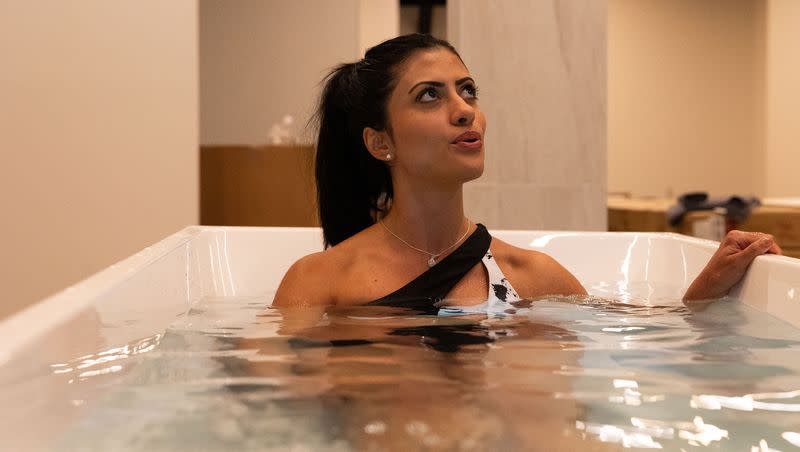Should cold plunge tubs be regulated in Utah? Here’s what a legislative committee decided

- Oops!Something went wrong.Please try again later.
For Cathryne Hundley, cold plunges have been “a lifesaver.”
Hundley, a co-owner of Ash & Ice, described as a sauna and cold plunge wellness center in Pleasant Grove, told Utah lawmakers Friday that spending time in a tub of icy water has kept her going after a multiple sclerosis diagnosis two years ago.
“It has restored my eyesight and my ability to walk. If I feel an MS attack coming, all I need to do is three minutes in cold water immersion and suddenly feel my feet again, and my eyes come back,” she testified during a Senate Business and Labor Committee hearing.
Related
An attorney and mother of three, Hundley said the plunges have enabled her not only to keep working and parent her children, but also to compete in triathlons. She said the benefits extend to those with other health issues, including depression.
“I firmly believe that access to this type of service is so important for me and other disabled Utahns, but the problem has been for the last year for us, the health department has overreached” by regulating the tubs like swimming pools, Hundley said.
Installing just a single commercial tub that meets the regulations for swimming pools costs more than $300,000, an expense too high to pass along to patrons, while requiring lifeguards, fencing and ladders, she said.
The committee voted unanimously to advance SB106, to the full Senate. The bill prohibits state health officials from regulating public cold baths that are maintained at a temperature below 60 degrees and hold less than 180 gallons of water.
Hundley said later that Ash & Ice has remained closed due to the regulations. Her brother, Benjamin Harrison, another partner in the business, told the Deseret News cold plunges, already popular in Utah County, are catching on across the country.
“I think it’s a big movement. It’s been around for thousands of years, this treatment. I think people are just getting wise to it in the United States,” Harrison said. “We’re not making claims that haven’t been established by studies.”
The sponsor of the cold plunge legislation and the committee’s chairman, Sen. Curt Bramble, R-Provo, said during the hearing that health officials acted because they felt they had a “statutory obligation” to regulate the facilities.
“These are cold therapy tubs basically. They’re not swimming pools,” Bramble said. “They don’t fit the regulatory structure for swimming pools. This would put them more in the realm of spas.”
Related
Sean Foster, owner of PLUNJ in Provo and Saratoga Springs, testified he replaced his cold plunge tubs “at great cost” to comply with regulations. The facility’s website said the cold plunge tubs were closed in April 2023 to bring the facilities “up to code.”
Foster suggested the bill be changed to address specific requirements for water quality and filtration “having gone both with the singular tubs and with a new commercial pool.” He said maintaining water cleanliness “is a very complicated subject.”
Bramble said he would look into the water issue, but “the check and balance on any business is one of liability.” He said liability insurance and “other criteria” would obligate businesses “to meet certain standards because the ... financial risk would be extraordinary.”
Sen. Karen Kwan, D-Murray, wanted to know if there would be any health or safety concerns with not regulating the tubs. Another committee member, Sen. Todd Weiler, R-Woods Cross, asked a similar question.
Bramble assured the committee there aren’t any health or safety concerns from spelling out that the tubs aren’t regulated.
Weiler said government’s primary role in regulating businesses “is to protect the public when there is a legitimate risk to health and safety.” Absent evidence of that, Weiler said, “this is America. Let people make their decisions and be free. Let businesses operate.”

